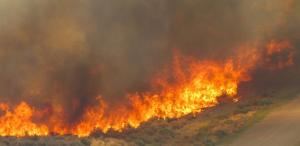“You brood of vipers!” This year in the midst of the impeachment hearings, we hear the words of John the Baptist knowing that a brood of vipers is running our country.

Text: Matthew 3:1-12
We’re a few weeks away from Christmas and some of us are feeling pretty good about ourselves. Most people I’ve talked to have at least started on their Christmas decorations and shopping. This is the time of year when people are willing to open up their hearts and wallets and go that extra mile to give a little more. Then you sit in the pew and you hear the words of John the Baptist: “You brood of vipers!”
Well. That’s not very nice, is it?
This year, we encounter this text in the midst of the impeachment hearings of the President of the United States.
Witness after witness has testified that, in effect, there is a brood of vipers running this country. They have invited foreign interference in our country’s democracy. Their venom has toxified our communal discourse. It has stirred up hate crimes and emboldened white supremacists. Their sickening rhetoric has justified the caging of children. And it has opened the floodgates for the literal poisoning of our water, air, and land.
Well, that’s not very nice, is it?
John the Baptist shows us that when it comes to confronting the toxic poison in our society and culture, we can’t be “nice.” We must be truthful, assertive, and courageous.
In her article, “In Praise of Empathic Anger,” Assertive Spirituality writer D.S. Leiter explains why being “nice” is not what is called for when your in the midst of a brood of vipers.
“The toxic forms of “Christian nice” often tell people to suppress their “negative emotions” by promoting a form of “toxic positivity.” The same forms of Christian Nice often end up unwittingly supporting oppressors and abusers at the expense of victims by too-quickly calling for the kind of “cheap forgiveness” from abuse survivors and oppressed peoples.”
“Christian nice” is exactly what John the Baptist is not.
According to Matthew, John was the son of Elizabeth and Zachariah and cousin to Jesus. When he came of age, he went into the wilderness where he received the word of God. He then reappeared looking like a wild man, preaching about repentance.
At the Jordan River people came out to this strange prophet to be baptized. These were ordinary people like you and me – office workers and bankers, people who work for the government, people who’ve served in the military. Men and women, teachers, parents, builders, lawyers and healers. And just like us, these are basically good people. These are not hardened criminals.

So why is John calling them a brood of vipers?
Well, even though John didn’t know Martin Luther, but he probably would have agreed with a phrase that Luther used to describe people like us:
simul justus et peccatore
It means, at the same time justified and sinning. Simultaneously saved and condemned, healed and broken.
It’s the paradox of the human condition. We are at once loved and embraced by the grace of God, yet we exist in a world and time where we hurt each other. We damage our planet, both individually and as a global human system.
So when John describes us as a brood of vipers, we know there is some truth to what he is saying.
He goes on to say that just because you have received the inheritance of God’s chosen people, don’t think that you can just sit back comfortably and expect the kingdom to come to you on a silver platter. The tree that doesn’t bear good fruit will be chopped thrown into the fire.
The curious thing about this scene is that the people do not turn away when they hear this scathing indictment.
They stick around to hear what John has to say next. And I think the people deserve some credit for this. They recognized the inherent truth in John’s words and were willing to pay attention to what he had to say.
Perhaps that is why we stick around as well. To our credit, many of us keep coming back to hear the hard truths, even when we know it’s going to be uncomfortable. We know that at some level, John is addressing us. And as good as we are, we have that capacity to be a brood of vipers.
Then John goes even further with his provocative rhetoric.
I baptize you with water. But one who is more powerful than I is coming. It would be a big deal for me just to tie his shoelaces. You have no idea what you’re in for. He will baptize you with the Holy Spirit and fire.
Fire? Why would God send a messiah who would burn us?
His winnowing fork is in his hand, to clear his threshing floor and to gather the wheat into his granary; but the chaff he will burn with unquenchable fire.
Winnowing fork? Chaff? Unquenchable fire? What is John talking about?

This is not the messiah we had in mind. This is not what we signed up for.
You see, when John received the word of God, he received a revelation. What is ultimately required of humanity in order to unite with God is a giving over of oneself, a complete offering of one’s heart and soul. A willingness to completely entrust one’s entire being to the God of Creation.
What this Messiah wants is your heart — your soul — the very essence of your being.
And that — that is the one thing we cannot bring ourselves to do.
Because of simul justus et peccatore, this is the one thing we cannot sign up for. Oh we may want to, we may have a genuine desire.
But the truth here is that there is nothing we can do to get to God.
Which means that this Messiah will have to get to us.
This will not be an easy process, says John. This Messiah will have to burn through layers of our hardened hearts, will have to cut through the thicket of weeds and thorns that choke our human community. This Messiah is an unquenchable fire that seeks to penetrate and purify. To smelt us down, and burn away all that keeps us from true union with God.
It appears that our own nation is in the midst of this purifying fire. This impeachment process is a fire that is kindled by what D.S. Leiter calls empathic anger.
“Empathic anger is grounded in love and empathy and clearly grounded in clear evidence . . . it is the polar opposite of unhealthy aggression and needs to be treated very differently.”
And let there be no doubt — the impeachment process is not about unhealthy aggression. It is about stopping unhealthy aggression. And this process will not be “nice.” It will not be comfortable.
We will experience pain. We will come to know deep sorrow. We will come in contact with that sinful part of our own nature. We will see the brood of vipers in all their poisonous power.
But that discomfort will serve as a gateway. Empathic anger will break down our defenses and allow the realm of the transcendent to penetrate our souls and prepare us for the coming of Christ.
It is agonizing to witness and experience this process. Because the way of God is not an easy way. And the embrace of God does bring pain.
But if you hold on, if you keep coming back, if you stand strong in the fire of God, you will come to the other side fully engulfed in the love and justice of God in a way you had not experienced before.
So brace yourselves for the impact. And be on the lookout for the fire.
It starts with only a small spark…
in a manger…
full of dry hay.

Leah D. Schade is the Assistant Professor of Preaching and Worship at Lexington Theological Seminary in Kentucky. She is the author of Preaching in the Purple Zone: Ministry in the Red-Blue Divide (Rowman & Littlefield, 2019), Rooted and Rising: Voices of Courage in a Time of Climate Crisis (Rowman & Littlefield, 2019), and Creation-Crisis Preaching: Ecology, Theology, and the Pulpit (Chalice Press, 2015).
Twitter: @LeahSchade
Facebook: https://www.facebook.com/LeahDSchade/
Read also:
Rooted and Rising in Advent: 28 Days for Connecting with Earth













